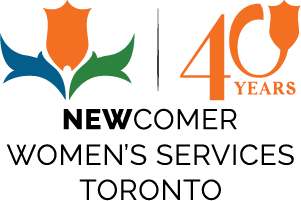Meet some “NEW” people: English teacher Dhurata Sinani
Dhurata Sinani is an English teacher at Newcomer Women’s Services.
BY REMA AL NADER
From a young age, Dhurata Sinani fell in love with English and wanted to become an English teacher. Born in Vlora, a beautiful seaside city in Albania, Dhurata had a happy childhood. However, her upbringing was unlike most. At the time, Albania was under the communist rule and the state-imposed many restrictions on its citizens. You couldn’t travel abroad without the government’s permission, many books were banned and foreign TV and radio channels were jammed. Dhurata was fortunate to have access to ideas about the outside world through her father Hasko.
“He was a well educated and cultured man,” she says. “He had studied abroad, had a great knowledge of history and philosophy and he shared insights about the world with myself and my brother that countered the false illusions that were fed to us by the authoritative state”. She credits her dad with instilling in her a profound love for languages. It was Dhurata’s way to connect with the outside world.
"I started learning English in fifth grade. From then on, I knew I was determined to become an English teacher. Teachers are one of the most important pillars within our societies, yet their efforts are oftentimes the most discounted. We shape the minds of our future leaders."
Dhurata Sinani
Dhurata also wanted to learn German, so she jumped at the chance to work there and study the language. Germany was a whole new world for me,” she says. “I gained a perspective on a new different culture.” It was an experience that would later make her settlement in Canada much easier.
In 2002, Dhurata had an opportunity to move to Canada where she landed a job working as an interpreter for the Attorney General and IRB (The Immigration & Refugee Board). There she developed entirely new knowledge of the Canadian legal system and immigration system. “It was a very eye-opening experience as I was able to understand the process through the other side,” Dhurata says. “Being an immigrant myself and experiencing this alternate perspective helped me have triple the empathy for this strenuous process that many immigrants and refugee claimants face.”
After seven years as an accredited interpreter, Dhurata realized it was time to go back to teaching. After she received her TESL certificate, she began applying for teaching jobs in the GTA area. Her break came when she was hired as a supply teacher for Newcomer Women’s Services. This role evolved into a full-time position and she’s been here ever since teaching the women-only English classes.
“Everything fell into place rather quickly,” she recalls. “I was very excited to go back to teaching, yet it wasn’t without its challenges,” she recalls. “The portfolio-based language environment was a struggle to adapt to. However, I was very determined as I believed it to be greatly beneficial to my seniors’ class. So, I persevered, and took it step by step and monitored my students’ progress which was evidence of the success of this new method of assessment.”
Dhurata had always made an effort to remain open-minded when encountering new technologies or experiences. “One of my biggest inspirations is Nelson Mandela. I am deeply inspired by people who think dialectically, are open-minded, and whose objectives are centred around bringing people together and advocating for social justice.”
Dhurata continues to bring that same adaptability and open-mindedness to the classroom. Due to COVID-19, the education landscape has faced a drastic shift. In the transition to the more online-based learning environment, Dhurata has fully adapted to a new teaching model. “From the start, I wanted to ensure the transition as swiftly as possible. I wanted to make sure everyone was included, and no one was left behind.” Dhurata says.
"I realized very quickly there was a discrepancy in the equality of technological skills. So I ensured I adapted the curriculum to include both language learning and digital literacy content. I worked with the other teachers at NEW (Shereen, Elizabeth, and Olga) on how we can provide an optimal teaching experience to our students."
Dhurata Sinani
Dhurata hopes she can continue learning more about the programs that can positively complement her students’ learning experience, improve accessibility, and improve connection. In addition to teaching, she hopes she can find a way to incorporate her love of books and language translation in her future endeavours.
Top: Dhurata is pictured presenting a speech for the book she co-authored and published called Beyond the Journey: Women’s stories of Settlement and Community Building in Canada.
“I am very interested in going deeper into language through book translation. I am fascinated by language interpretation and analysis. At the moment, I am focused on my students, but I hope I can find a way to incorporate this interest of mine along with my teaching work in the near future.”
Excerpt from Dhurata’s book
“Working as an interpreter means you can help people in your community, and give them the chance to have a voice in this new country. And I really enjoyed it. I felt I had some worth, which always made me proud of myself. You feel good when you come across people and they show some gratitude. I love helping my community, it keeps the torch of Albanian heritage burning and keeps alive that part of me which will be forever Albanian. Albania moulded me, shaped my character, and my personality; Canada toned them, making me even more balanced.”
For more information on the women-only English language programs offered by Newcomer Women’s Services, click here.
Meet some of the other NEW Team members:
Recruitment specialist and employment counsellor K.C.Waran
English teacher Shereen Gharseldin
Youth employment specialist Gersom Rodriguez
Youth employment specialist Latoya Dell


